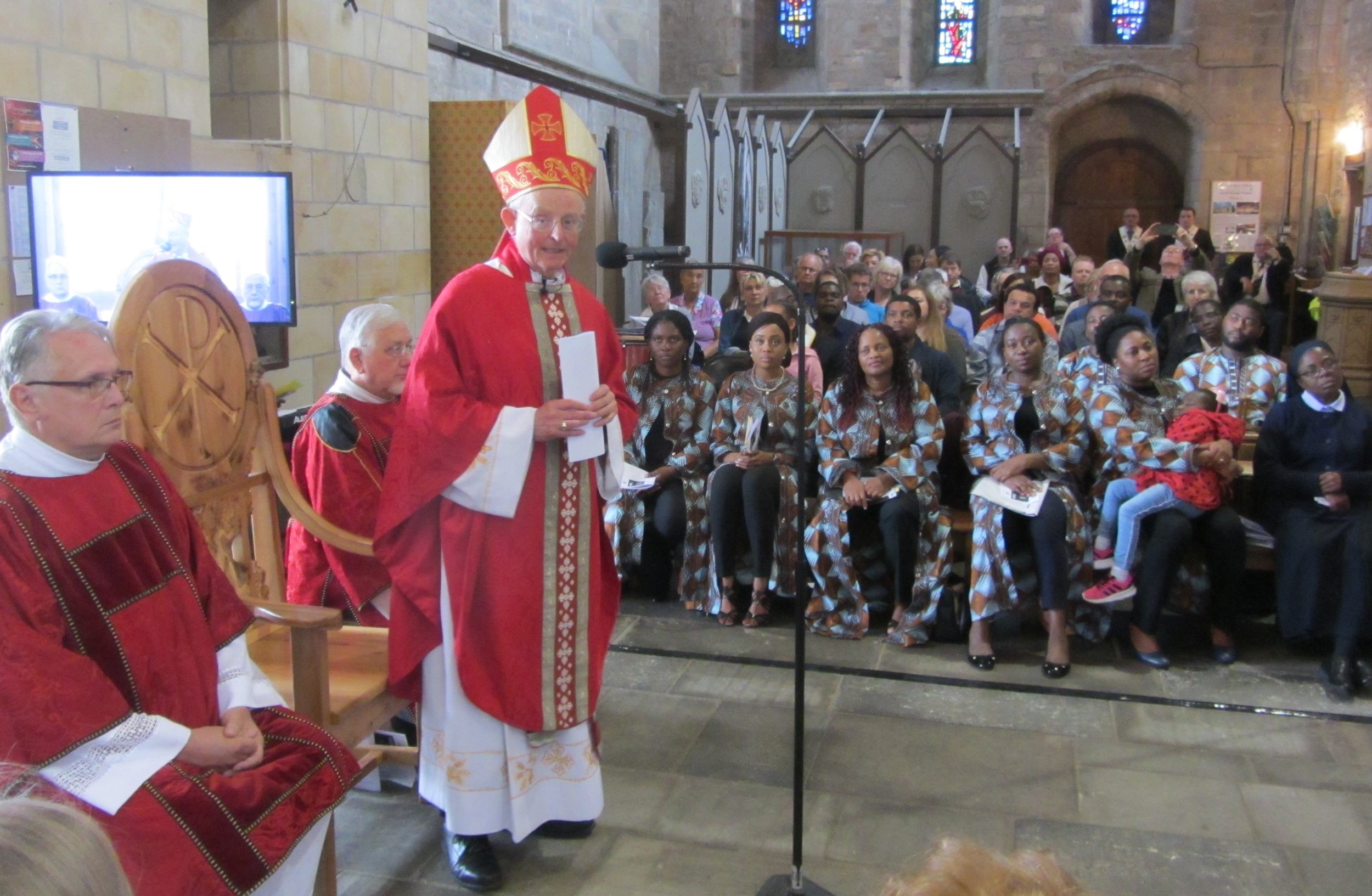
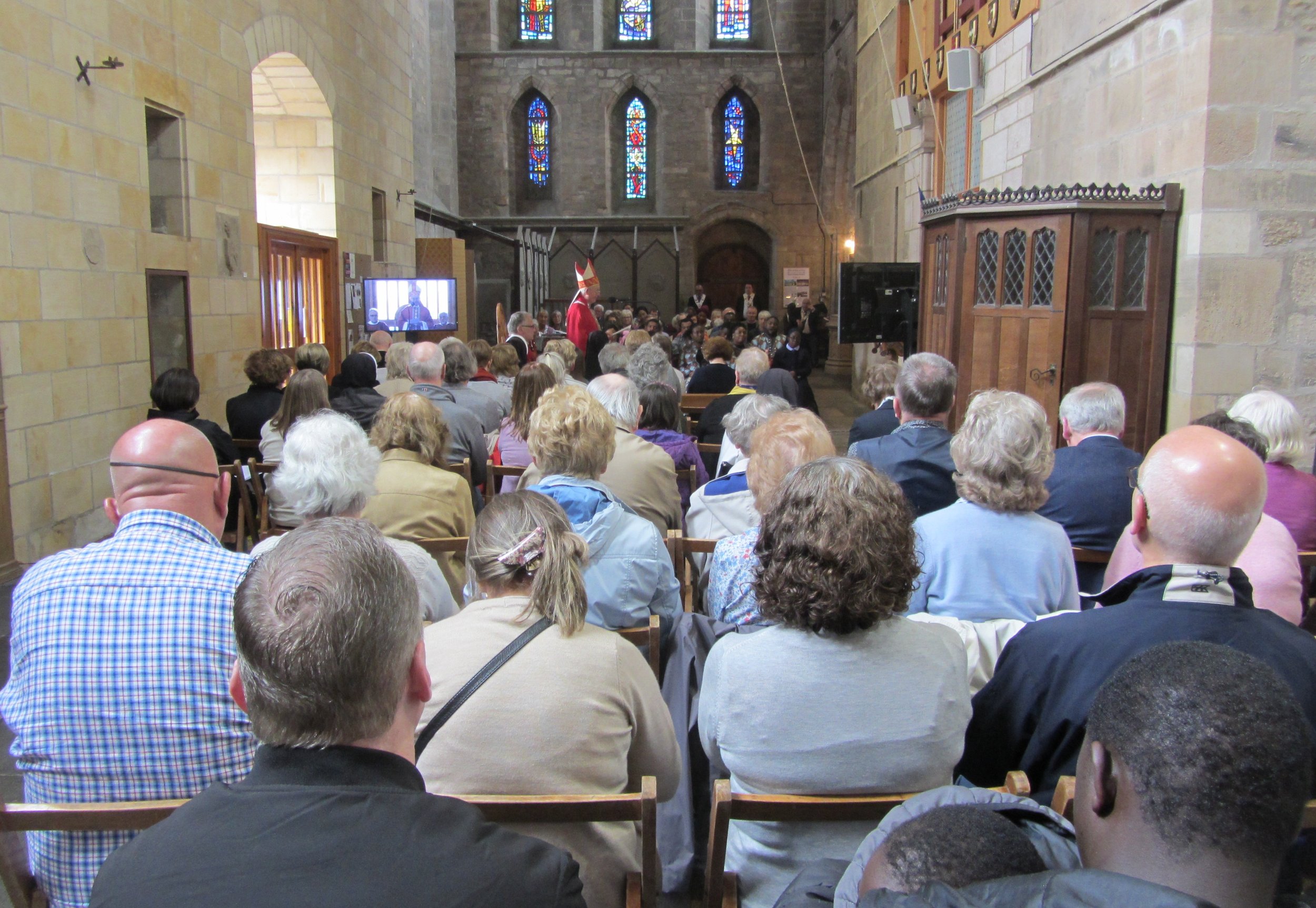
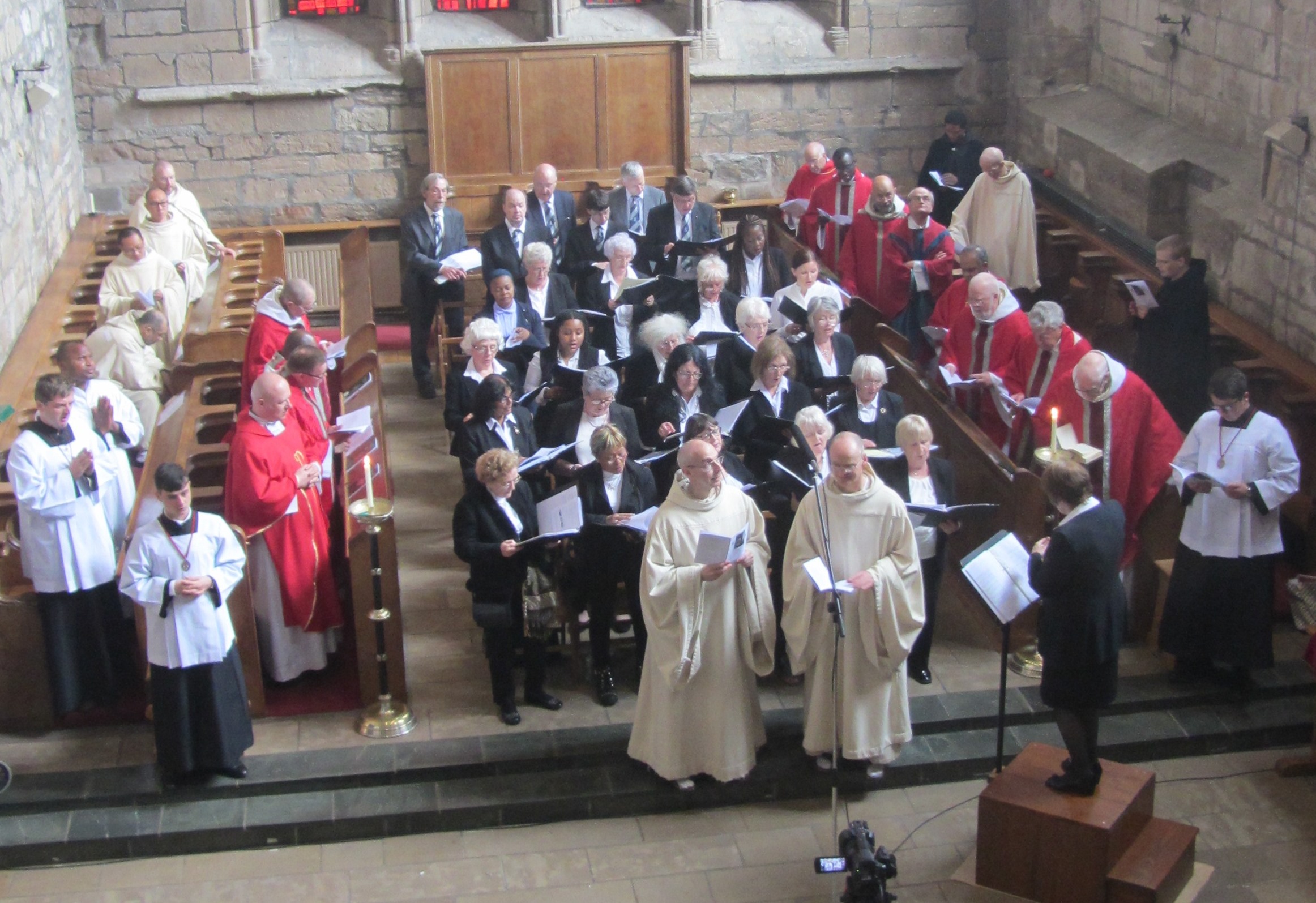
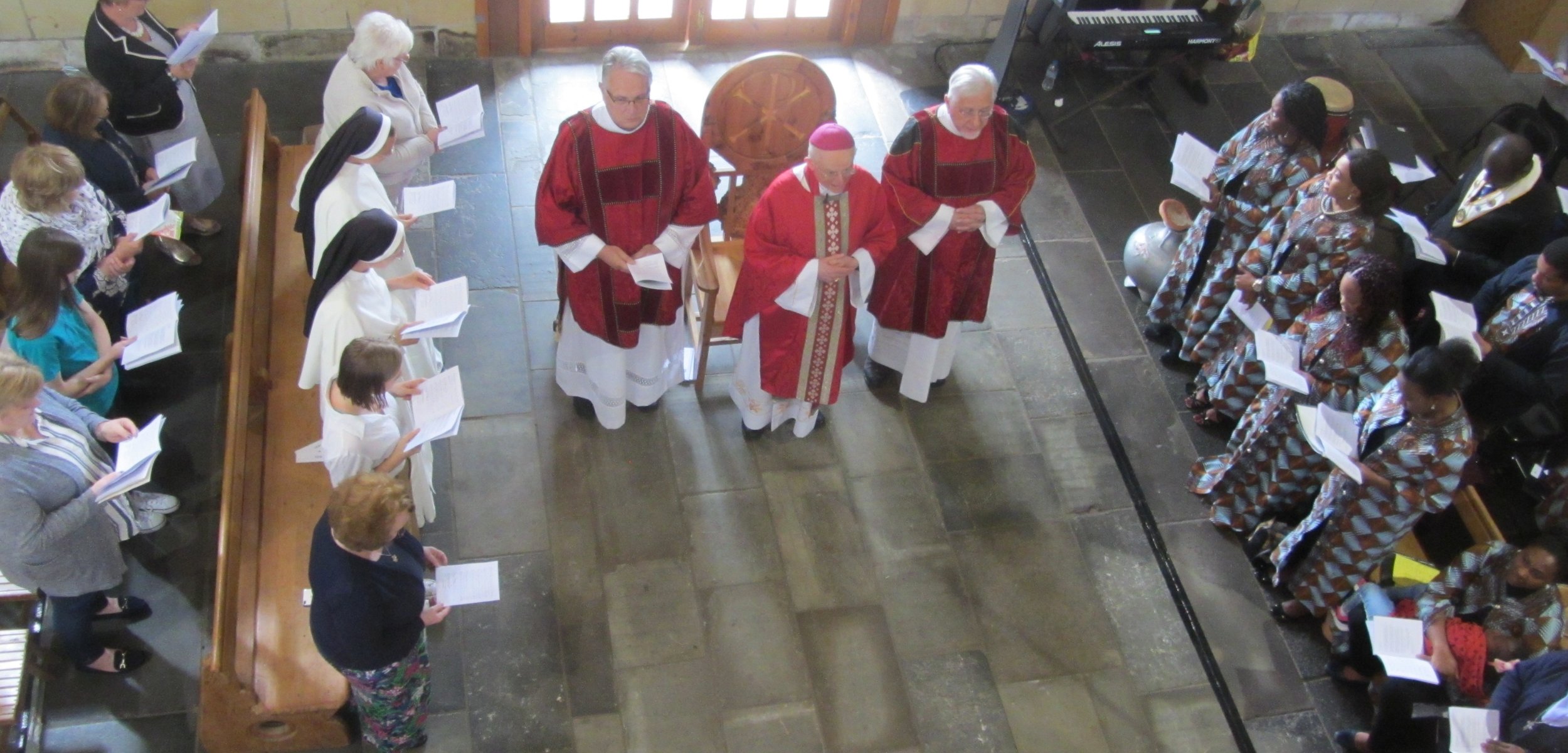


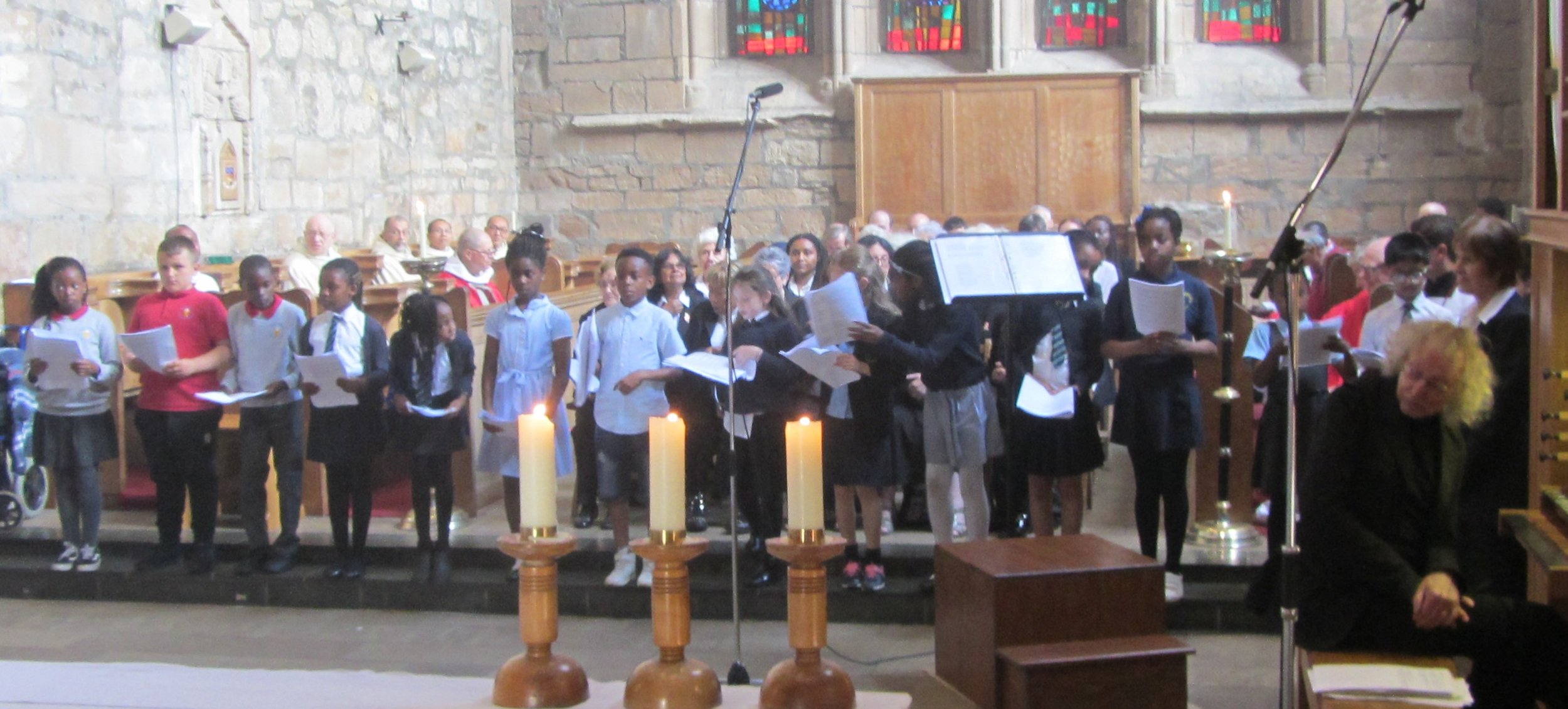
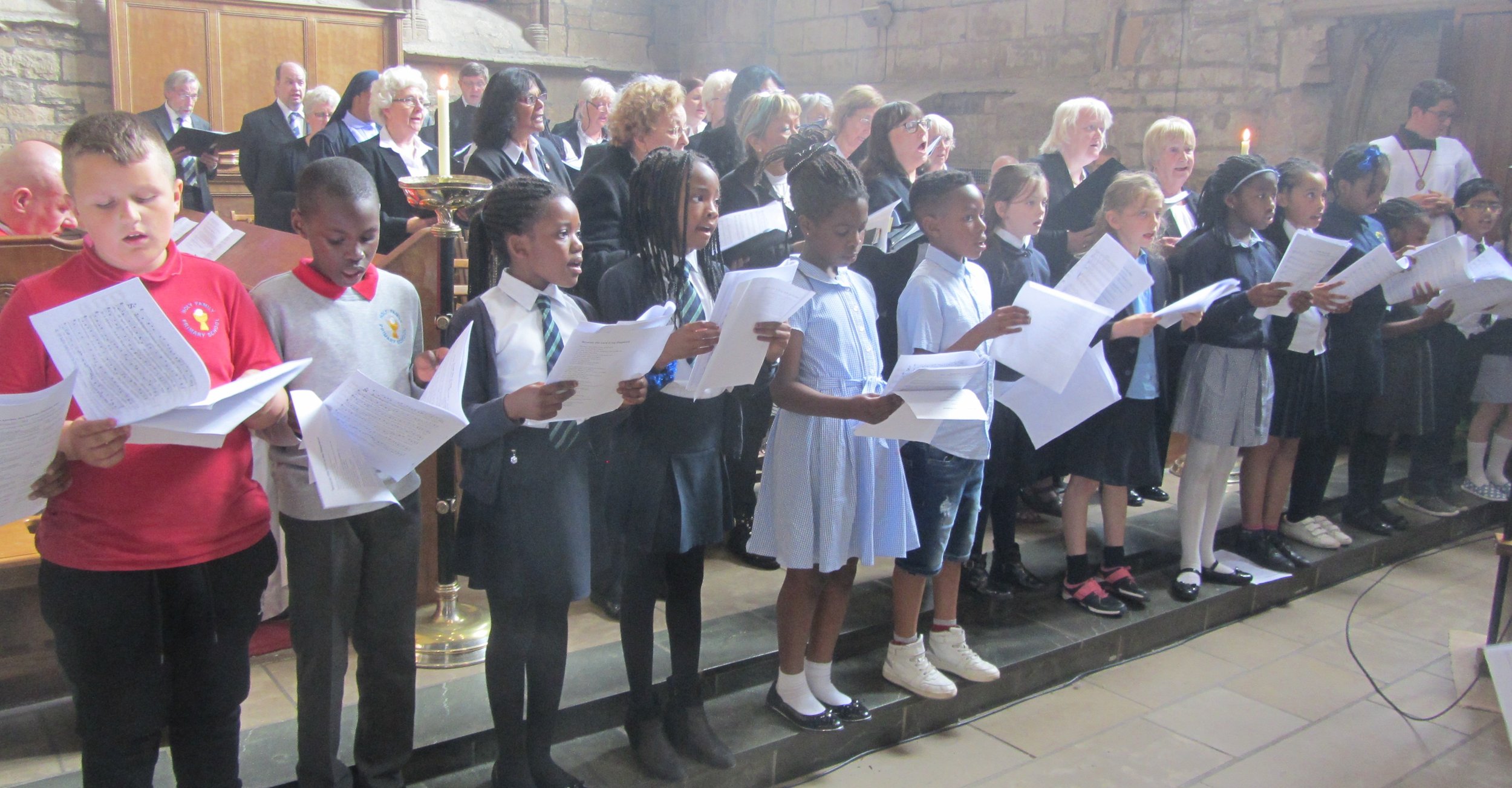

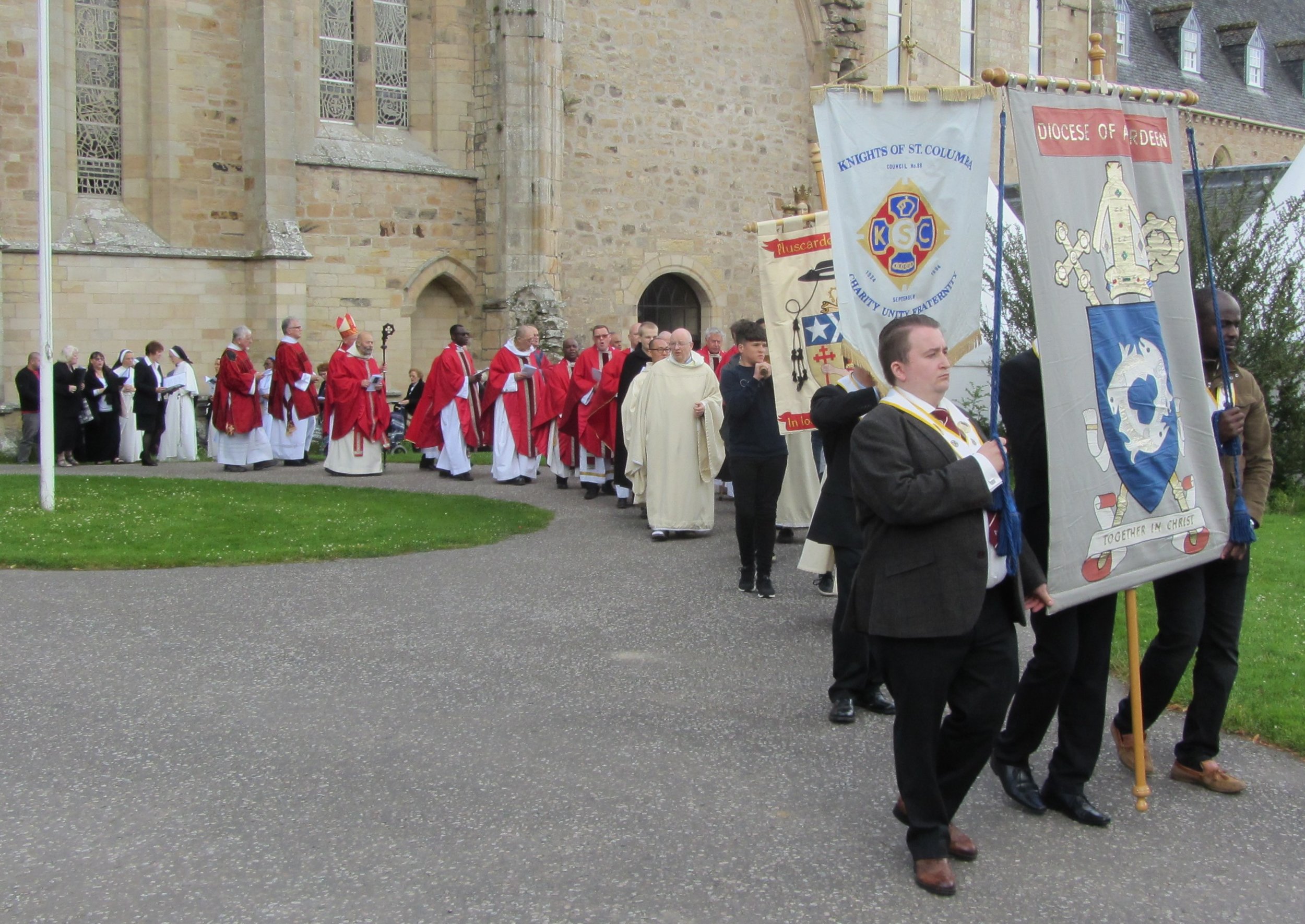
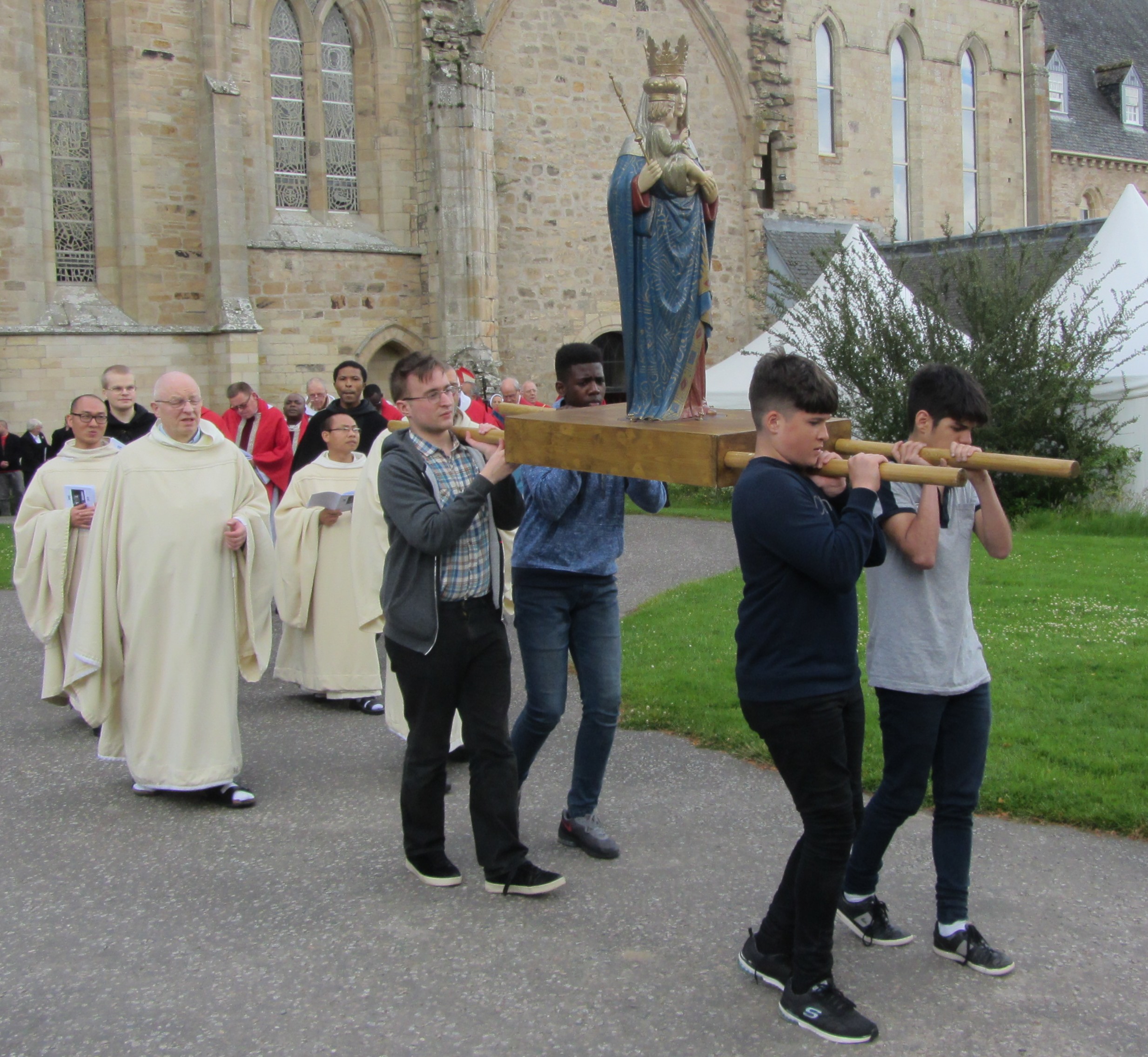
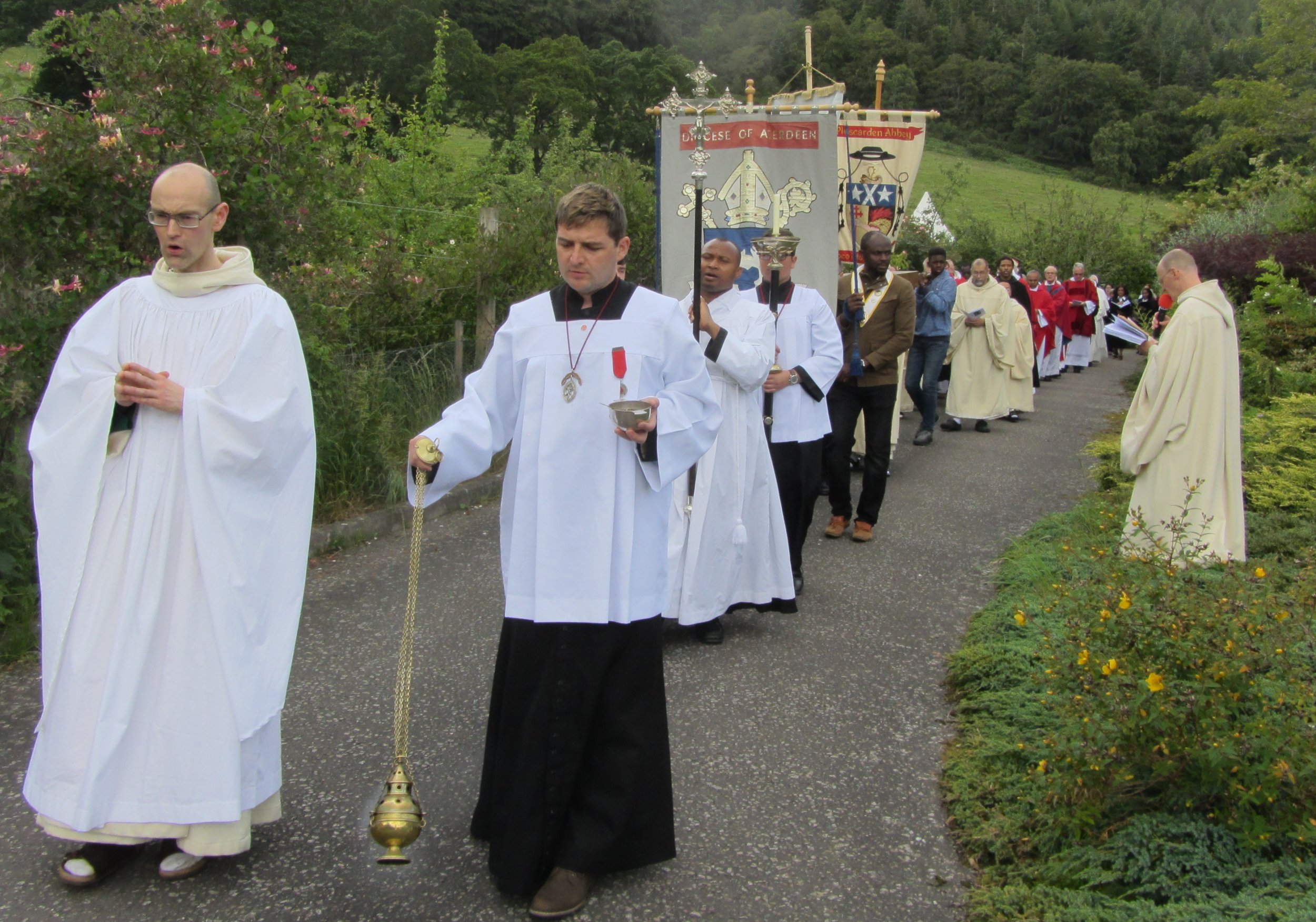
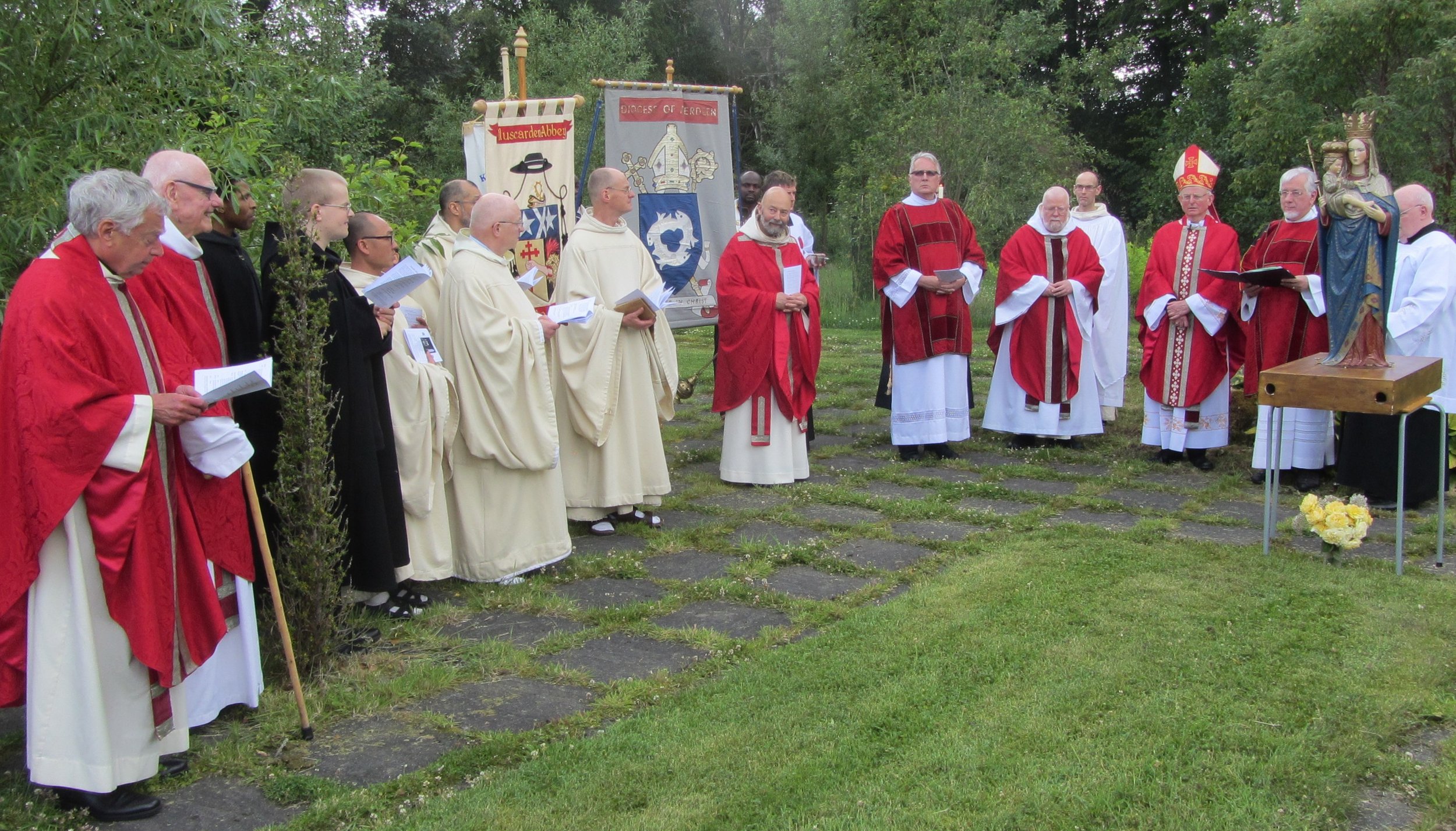

According to annual custom, Bishop Hugh led a Pilgrimage of the Aberdeen Diocese to Pluscarden on Sunday 30 July. This year in Scotland that day was kept as the transferred Solemnity of SS. Peter and Paul. As last year, our Pilgrimage congregation was much enlivened by the presence of many children and young people, led not only by parents or teachers but also by their parish Catechists, whose work in particular Bishop Hugh wanted to highlight. So every possible space in our Church was packed full for the Mass at 3.00 p.m., with the large marquee on the Nave also filled to capacity with worshippers. Five large flat screens and an excellent sound system relayed the liturgy for those placed where they would otherwise be unable to see or hear. The Pilgrimage liturgy was enhanced by no fewer than four Choirs: the Diocesan Choir, a children's Choir, the African Choir and the Monks' Choir.
Steady rain was forecast for the day. Many prayers were nevertheless offered for fine weather. So it seemed a true miracle when, in spite of leaden skies in the morning, the whole day turned out to be blessed by fair, dry weather. Folk were therefore able to picnic on our lawns before the Mass, during which period also Priests were available for confessions, and the Blessed Sacrament was exposed in the Lady Chapel for adoration. A team of helpers stood well prepared to serve refreshments for all comers. At the end of Mass the whole congregation was able to process to St. Benedict's garden for Marian devotions, centred this year, for the first time ever, on the statue of Our Lady of Aberdeen, brought specially from Aberdeen Cathedral.
A group of 36 young people, led by members of the St. Andrew community, spent the whole weekend in the monastic guest houses, fully occupied with games, catechesis, walks, rosary, outings, adoration and attendance at various liturgies. Games for younger children before the Pilgrimage Mass were organised in front of the Church by the Elgin Dominican Sisters. Meanwhile some 16 hardy souls walked in for the occasion along the pilgrim way from Elgin.
Bishop Hugh's homily is given below, together with a selection of pictures to give some indication of what was a blessed and happy occasion for all involved.
HOMILY FOR THE DIOCESAN PILGRIMAGE TO PLUSCARDEN
Today we keep Ss Peter and Paul. It’s good to remember them, say thank you for them and ask their prayers. They are very much part of our Christianity. They were there at the very beginning. They each came to know Jesus, differently, but deeply. One can say they fell in love with him and their whole lives were recast by that experience. They lived two thousand years ago, but their humanity, their personalities shine out. Christ doesn’t erase these things; he draws them out. Peter the impetuous, generous fisherman, often falling over himself, but always by God’s grace coming right in the end: the wobbler made the Rock, the run-away the Shepherd. “Lord, to whom can we go? You have the words of eternal life.” “Lord, you know everything; you know that I love you.” How not warm to a guy like that? Paul, the passionate rabbi, persecutor of the early Christian community, floored and blinded by the risen Christ outside Damascus, turned herald and preacher of the Gospel, of God’s plan to reconcile heaven and earth, Gentile and Jew, the weak and the strong in the one Body of the one Christ. Paul who can say: “I have been crucified with Christ, and I live now not with my own life but with the life of Christ who lives in me” (Gal 2:19-20). Paul so conscious of his mission: “This is the Christ we proclaim, this is the wisdom in which we thoroughly train everyone and instruct everyone, to make them all perfect in Christ. It is for this I struggle wearily on, helped only by his power driving me irresistibly” (Col 1:27-29). Paul father and mother to the communities he founded or built up or fought with, their names like regimental battle honours: Antioch, Perga, Iconium, Lystra, Ephesus, Philippi, Thessalonica, Corinth, Rome. Paul, matchmaker of the Church’s wedding to Christ: “…the jealousy I feel for you is God’s own jealousy: I arranged for you to marry Christ so that I might give you away as a chaste virgin to this one husband” (2 Cor 11:2). Paul, longing in return for his fellow Christians’ love: Corinthians, “Open your hearts to us” (2 Cor 7:2). Paul, looking back on a tempestuous life: “I have fought the good fight to the end; I have run the race to the finish; I have kept the faith” (2 Tim 4:7). How not be inspired by a guy like this? How not, sometimes anyway, catch the flame? And in the end, Paul bowing his neck to a sword and Peter being bound to a cross. The two lovers of Christ, now the two prophetic witnesses, “the two olive trees and the two lamps that stand before the Lord of the world” (Rev 11:4), their two spacious basilicas in Rome a sign of the new space their ministry has opened up for the world. “Their voice has gone forth through all the earth, their words to the utmost bounds of the world” (Ps 18:5).
Yes, it’s good to feast them. It’s good because they heard the new sound which is Christ and through them it has echoed, re-sounded to us. It’s good because they remind us, in Pope Francis’ words, that “it is not the same thing to have known Jesus as not to have known him, not the same thing to walk with him as to walk blindly, not the same thing to hear his word as not to know it, and not the same thing to contemplate him, to worship him, to find our peace in him, as not to…We know that with Jesus life becomes richer and that with him it is easier to find meaning in everything” (Evangelii Gaudium, 266).
So, there’s a first thing: the transforming power of the risen Christ, made visible in those two men and echoed in their profession of faith: “you are the Christ, the Son of the living God”.
And here’s another: the one I’d like to put in bold today. If we burrow into the New Testament, we find that Peter and Paul, vivid individuals as they are, are always surrounded, accompanied, assisted, energized, enlarged, enabled, completed by others. It is the same in the communities they founded and cared for and wrote to. The apostles, as time passed, appointed successors, proto-bishops, men like Timothy and Titus, but they in turn were surrounded and accompanied by others too. Each community was a cooperative, as it were. There’s New Testament talk of elders or presbyters, prophets, teachers, evangelists, pastors, helpers, administrators. A complex multi-membered organism is emerging. One of the beauties of the theodrama of our faith and our Church is that, beside the tall trees and the golden lamps, the heroes and holy celebrities, the apparent leading players, there is room for minor characters too. There are dramatis personae galore, parts for everyone, myriad ways of engaging in the work of the Lord. Read the Acts of the Apostles with, beyond Peter and Paul, its Stephen and Barnabas, Judas and Silas, Lydia and Rhoda, Prisca and Aquila and Apollos and so many others, so many names. Go to the last chapter of St Paul’s Letter to the Romans and it’s like googling a list of alternative names for your children: Andronicus and Junias, Epaenetus, Ampliatus, Urban, Aristobulus, Narcissus, Tryphaena and Tryphosa, Hermes, Hermas, Philologus and Julia. The Holy Spirit bothered to inspire St Paul to name these names (only a selection). “Give [Phoebe], he says, a welcome worthy of saints…she has looked after a great many people, myself included” (Rom 16:2). Silvanus “is a brother I can trust”, writes St Peter at the end of his 1st Letter; it’s Silvanus who did the physical writing of the letter. And Mark is so close to Peter, he calls him “my son” (1 Pet 12,13).
So, here’s a second thing. Not just a first encounter with Christ, a hearing of the basic truths, a first conversion. Not just a profession of faith and a baptism. But these things putting down roots and putting out branches. Being embodied and embedded in a community, in the Church, in a shared life, a common discipline and practice, patterns of prayer, a body of teaching. There’s a Christian sociology. And this organism is on mission. It grows. It hands on what it has received. In this unified, diversified whole called the Church, “there are all kinds of service to be done”, says St Paul – always to the same Lord (1 Cor 12:5).
And among these many services and gifts of grace, there is the gift and service of catechesis. There are catechists. Here today’s drums can roll. This is to salute you, to thank you, to thank the Holy Spirit for you. I want to thank the parents who teach and mirror the basics and more to their children, take them to church, teach them to pray and say ‘sorry’ and be grateful, give them the name of Jesus. I want to thank those in our schools who prepare the children for the sacraments and teach RE. I thank those engaged in Childrens’ Liturgy. I want to thank the parish groups, and the Community of St Andrew and the religious sisters who provide so much. And especially I want to applaud and affirm and celebrate the catechists in our parishes. There are some 112 on the books. And thank you to the Dominican Sisters of the Ogilvie Centre who do so much to support you. Dear Catechists, you are precious. “Your voice goes forth”. What you’ve received, you pass on.
Every human being has the duty to seek the truth – in every domain and in the religious domain as well, in the realm of prayer and belief and way of life. Dear catechists, you are helping those you catechize fulfill that search. Again, every baptized Catholic child has the God-given right to hear, in time, “the whole message”, as Paul calls (cf. 2 Tim 4:17), the “whole plan of God” (Acts 20:27), and the Lord stands by you and helps you respond to that right. You are the successors of the “teachers” the New Testament mentions. You help the ordained in their ministry of transmitting the faith. You stand in a long and living line of saints. Only recently, a black South African teacher and catechist was beatified, Benedict Dawsa; he only died in 1990.
To catechize is to echo. There’s something lovely there. But to echo what? Not our own fads or obsessions or anxieties. Catechesis is an echo of the great voice and cry of creation and the truth of human nature, made in the image and likeness of God. An echo of everything good, true and beautiful. An echo of the Bible and the Gospels. An echo of the prayers and wisdom and teachings of the Church. Through catechesis the great enveloping Word of God, who holds all things together, echoes in our poor words, in a very humble way. And the Holy Spirit makes it echo in the hearts of the listeners. Listen to them too: to their questions, and their world. God knows, there’s plenty of the superficial about, of the downright dangerous and distorted. But even when that sounds out in discussions, there can be an echo of the true and the good. It’s always lurking somewhere. It needs to be rescued. Rabbi Jonathan Sacks wrote somewhere of “being true to the call of eternity, not the noise of now”. Catechesis is letting the call of eternity sound through the noise of now. “Abraham, Abraham!” “Samuel, Samuel!” “Martha, Martha!” “Saul, Saul!” St Benedict talks of “the ear of the heart” and of eyes opening to a deifying light. “The light shines in the darkness, and the darkness has not overcome it.” The light of Christ unmasks, discerns, rearranging, reordering, going deeper. “In your light, we see light”. Pope Emeritus Benedict ended a recent essay: “I would like to thank Pope Francis for everything he does to show us, again and again, the light of God, which has not disappeared, even today. Thank you, Holy Father!” Wouldn’t it be wonderful if at the end of every session of catechesis, you and your catechumens could thank each other for showing, once again, the light of God? There can be such beautiful flashes. So, thank you, catechists, for being there and letting this happen. And for heaven’s sake – St Augustine wrote a whole book on this: don’t get down about it. Be cheerful!
So back to Peter and Paul, and back to all of us. They received and they gave. “Their voice went forth”. We’re baptised and confirmed and all share somehow in the apostolate. Let’s be grateful that, with all our bruises and wounds and angers and unfinished business, God has made us part of this whole thing: of his Son, of his Church, of this crazy, beautiful hope. We’ve been caught in the net woven by Christ and cast by the apostles. Sometimes, somehow, let’s give what we’ve received to those coming after. The Lord requires it. It is a must. And the young deserve it. Amen.
Solemnity of Ss Peter and Paul, Sunday 30 June
